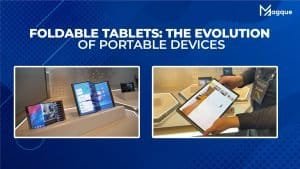Tablets have become integral to modern education, reshaping how students learn and teachers instruct. These sleek, portable devices have burst onto the educational scene, offering a world of possibilities to both educators and learners. In this blog post, we’ll dive into the captivating realm of tablets in education, exploring their benefits, challenges, and profound impact on classrooms worldwide.
Embracing Technology in Education
As we navigate the 21st century, technology is evolving unprecedentedly. Educational institutions are embracing these changes, recognizing the need to prepare students for a tech-driven world. Tablets have emerged as a powerful tool for achieving this goal. With their user-friendly interfaces and interactive apps, tablets engage students in ways that traditional textbooks cannot.
Benefits of Tablets in the Classroom
- Interactive Learning: Tablets offer a dynamic learning experience through interactive apps, videos, and quizzes. Students can actively participate in lessons, making learning more engaging and enjoyable.
- Access to Vast Resources: The internet is a treasure trove of information. Tablets provide students instant access to abundant educational materials, allowing them to explore beyond the confines of textbooks.
- Portability and Convenience: Gone are the days of carrying heavy backpacks. Tablets are lightweight and portable, making it easy for students to take their learning wherever they go.
- Personalized Learning: Educational apps can adapt to individual learning styles and paces, providing customized content for each student. This tailored approach enhances comprehension and retention.
Overcoming Challenges
While tablets offer numerous benefits, they also present challenges that educators and students must address:
- Digital Distraction: The allure of social media and games can sometimes distract students from their studies. Teachers need to strike a balance between productive tablet use and potential distractions.
- Cost and Accessibility: Not all students have equal tablet access, creating a digital divide. Schools must ensure that tablets are accessible to all students, regardless of socioeconomic background.
- Technical Issues: Tablets can experience technical glitches, disrupting lessons. Schools should provide adequate technical support to minimize downtime.
The Future of Education
In conclusion, tablets have revolutionized education, offering convenience, interactivity, and personalized learning. However, their successful integration requires careful planning and management. As tablets continue to evolve, so will their role in education. The key lies in harnessing their potential while addressing the challenges they bring.
So, whether you’re a student eager to embrace technology or an educator navigating the digital landscape, tablets have firmly established their place in the ever-evolving world of education. Embrace the future, one tablet at a time.
Magque is here to provide the latest insights, trends, and information on the journey towards modern education. Stay tuned for more updates on how technology is shaping the educational landscape.
FAQs
Q1. How do tablets benefit students in the learning process?
Tablets benefit students by providing access to interactive learning resources, personalized educational apps, and instant access to a wealth of online information. They engage students more dynamically, making learning enjoyable and effective.
Q2. Are tablets replacing traditional textbooks in schools?
Tablets gradually supplement traditional textbooks in many schools but must be replaced entirely. They offer a digital alternative that can be more interactive and up-to-date. However, the coexistence of both mediums is typical, allowing educators to choose the most suitable materials for their teaching methods.
Q3. What challenges do educators face when integrating tablets into the curriculum?
Educators often face challenges related to digital distraction, ensuring equal access to devices among students, and addressing technical issues. Balancing the use of tablets with traditional teaching methods and managing students’ screen time can also be demanding.
Q4. How can parents support their children’s use of tablets for learning?
Parents can support their children by setting guidelines for tablet use, monitoring their online activities, and encouraging a balance between educational and recreational screen time. They can also stay informed about the apps and resources used in the classroom to assist their children with their studies better.
Q5. Are there any privacy and security concerns with tablets in education?
Yes, privacy and security are essential considerations. Schools and educators must protect students’ data and privacy when using tablets. They should use secure networks and ensure students understand the importance of responsible online behaviour. Parents and schools should also collaborate to create a safe online learning environment for students.
Read Also This:- Augmented Reality in Marketing and Education













